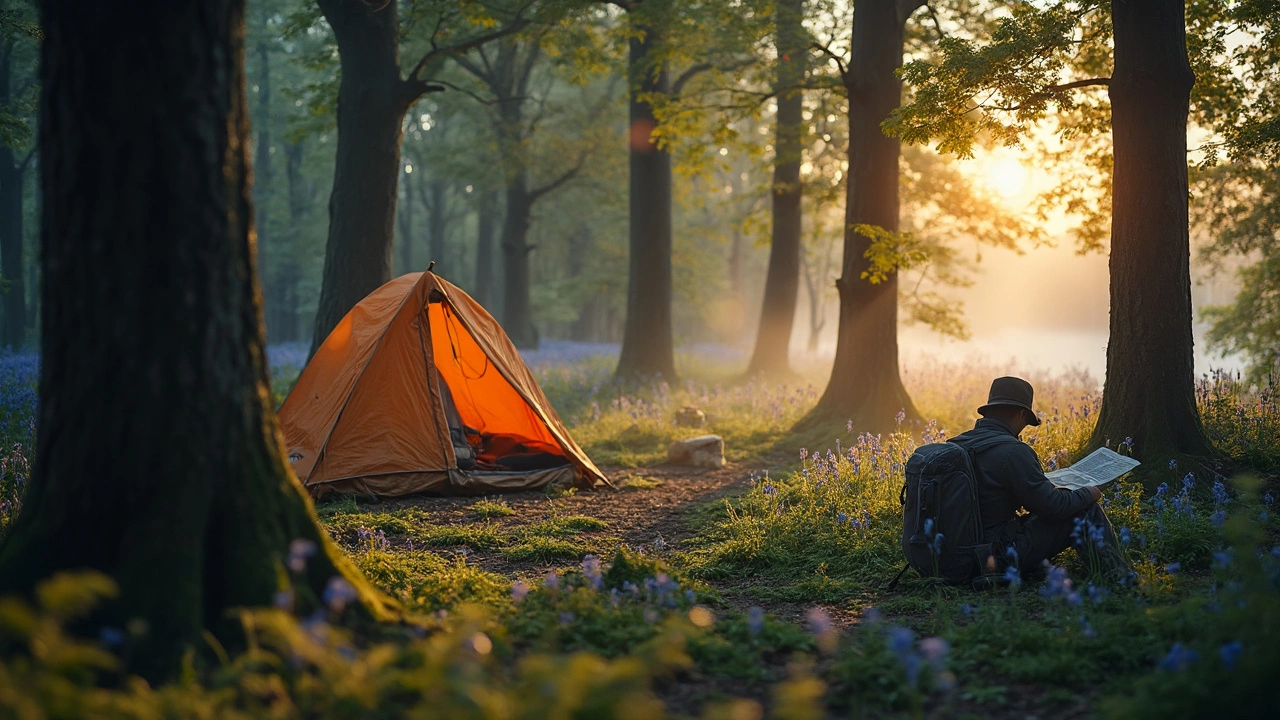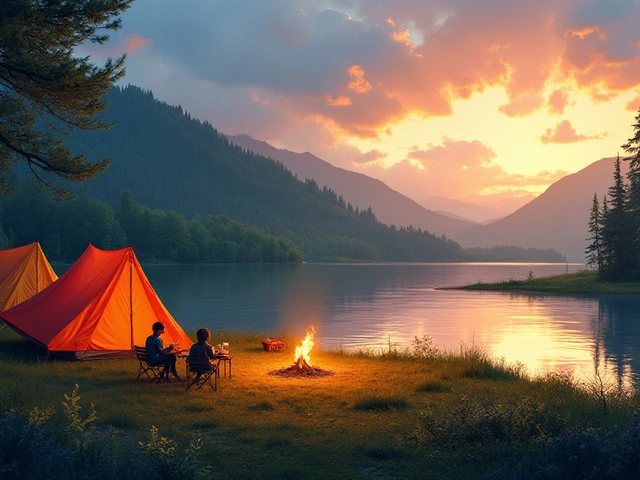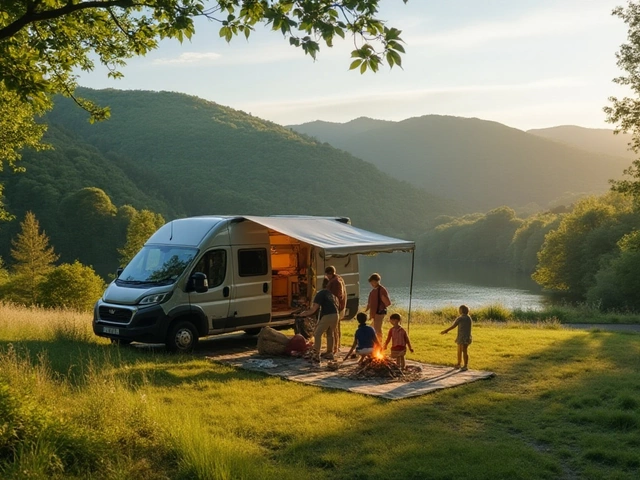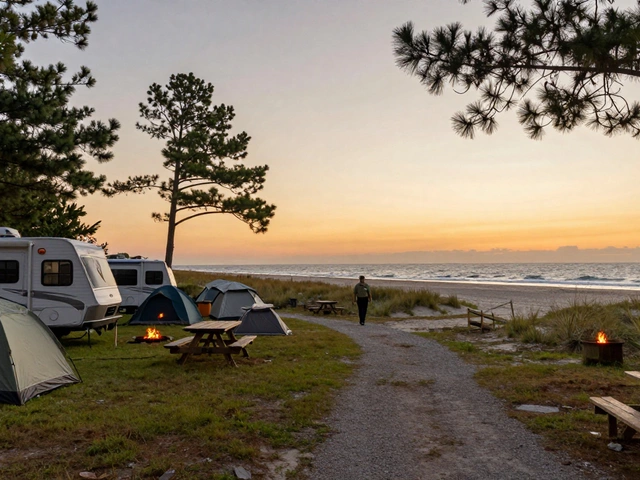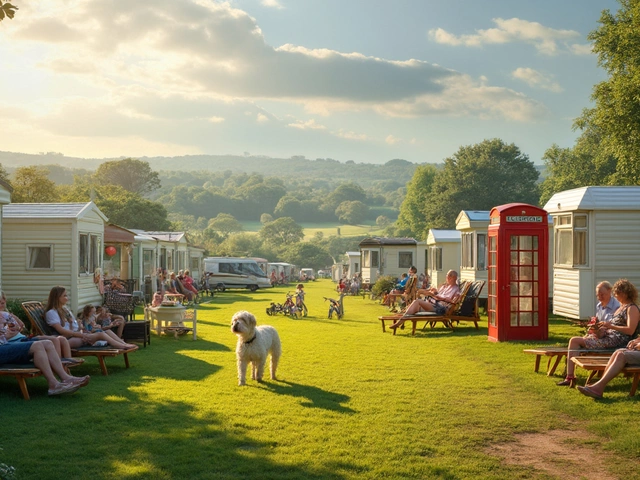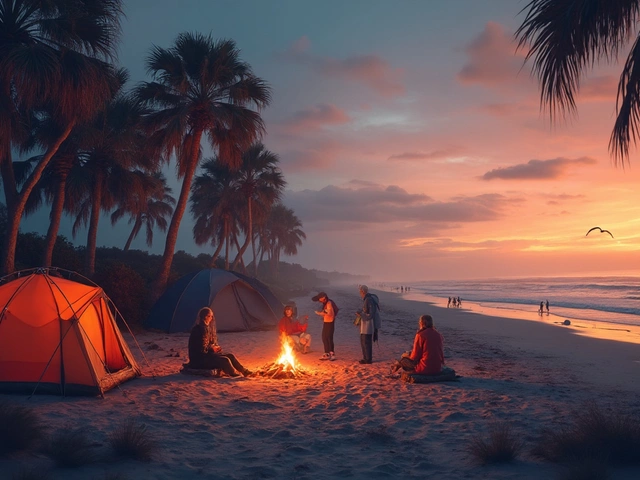Pitching your tent among tall pines or under a leafy oak in England sounds like the ultimate escape, right? The catch: wild camping in forests here is not as free and easy as in Scotland. In most of England, the land is privately owned, and you need the landowner’s permission if you want to camp legally—even in the most inviting woodland.
If you just show up and throw down your sleeping bag without permission, you're technically trespassing. Most forest land, even what looks wild and untouched, is managed by someone or some organization. The Forestry England sites, for example, often have posted signs saying no camping outside designated spots. Random camping can lead to you being asked to leave in the middle of the night, or worse—fined or reported.
- The Legal Reality of Wild Camping in English Forests
- What Happens If You Camp Without Permission?
- Legal Options for Forest Camping
- Tips for Responsible and Safe Camping
- Unexpected Spots and Alternatives
The Legal Reality of Wild Camping in English Forests
If you’re picturing absolute freedom with wild camping in England’s forests, it’s time for a reality check. Nearly all land in England is owned by somebody—whether it’s a farmer, a private person, a trust, or a big body like the Forestry Commission. This means you need permission to camp almost everywhere, even in places that look completely wild. Tossing up a tent without asking is considered trespassing and it’s not taken lightly.
Unlike Scotland, where their “right to roam” law makes wild camping far simpler, England is a different game. The Countryside and Rights of Way Act 2000 (CRoW) gives public access to some open country and registered common land—but camping isn’t automatically included. It only allows for walking, running, and a few other non-motorised activities. Forests, especially, are often off-limits to free camping unless there’s a specific agreement in place with the landowner.
Even public woodland managed by Forestry England—the folks running those big, beautiful forests—have got clear rules. Most ban wild camping unless a designated campsite is provided. Turning up and camping “discreetly” is still a legal risk. Here’s how the law works in practical terms:
- Almost all camping in English forests needs clear, written permission first.
- Pitching up without it? You’re trespassing, and can be asked to leave or moved on ASAP.
- Repeat offenses, damage, or anti-social behaviour can escalate things to police involvement or fines.
- Publicly owned forest doesn’t mean free access for overnight stays.
If you get permission, awesome—you’re good to go. Some forest owners will say yes to a polite request, especially for solo campers or very low-key groups. But just hoping to avoid trouble rarely works. Want to see how tricky it really is?
| Country | Chance of Legal Wild Camping | Key Rule |
|---|---|---|
| Scotland | High | Right to roam applies |
| England | Low | Landowner permission always required |
| Wales | Low | Also needs landowner’s OK |
Bottom line: in England, wild camping in forests isn’t a right—it’s a privilege you have to ask for first. If you’re all about being a responsible wild camping fan, getting that permission saves you stress and keeps things legal.
What Happens If You Camp Without Permission?
So, what actually goes down if you try wild camping in England's forests without asking first? Here’s where things get real fast. In England, the law sees unauthorized camping as trespassing. It’s a civil matter—so it’s not a criminal offense unless you refuse to move on when told. But that doesn’t mean you’re off the hook.
If a landowner, forest ranger, or Forestry England staff spots you, expect to be asked to pack up and leave, sometimes on the spot and even at night. If you argue or come back after being told to go away, you can actually be charged with aggravated trespass. That one is a criminal offense and could land you with a court date or a fine.
And it’s not just the police you have to worry about. If you’ve camped in a site owned by Forestry England or the National Trust, they can ban you from coming back. If you damage property, disturb wildlife, or leave a mess, expect the landowner to add clean-up costs or even press for prosecution.
Stats show more than 60% of forest sites managed by Forestry England have reported issues with unauthorized campers—mostly litter, campfire damage, or fire hazards. Here’s a quick look:
| Problem | % of Incidents (2024) |
|---|---|
| Litter left behind | 45% |
| Unattended campfires | 12% |
| Noise complaints | 8% |
| Damage to trees/land | 6% |
Also, don’t count on flying under the radar. Popular woods often see dog walkers or rangers passing by at all hours—especially during summer and holidays.
If you get caught camping without permission, just be polite, apologize, and pack up fast. Acting cool and moving on usually means you won’t get in serious trouble—but you’ll definitely leave with nerves rattled and probably your night ruined.
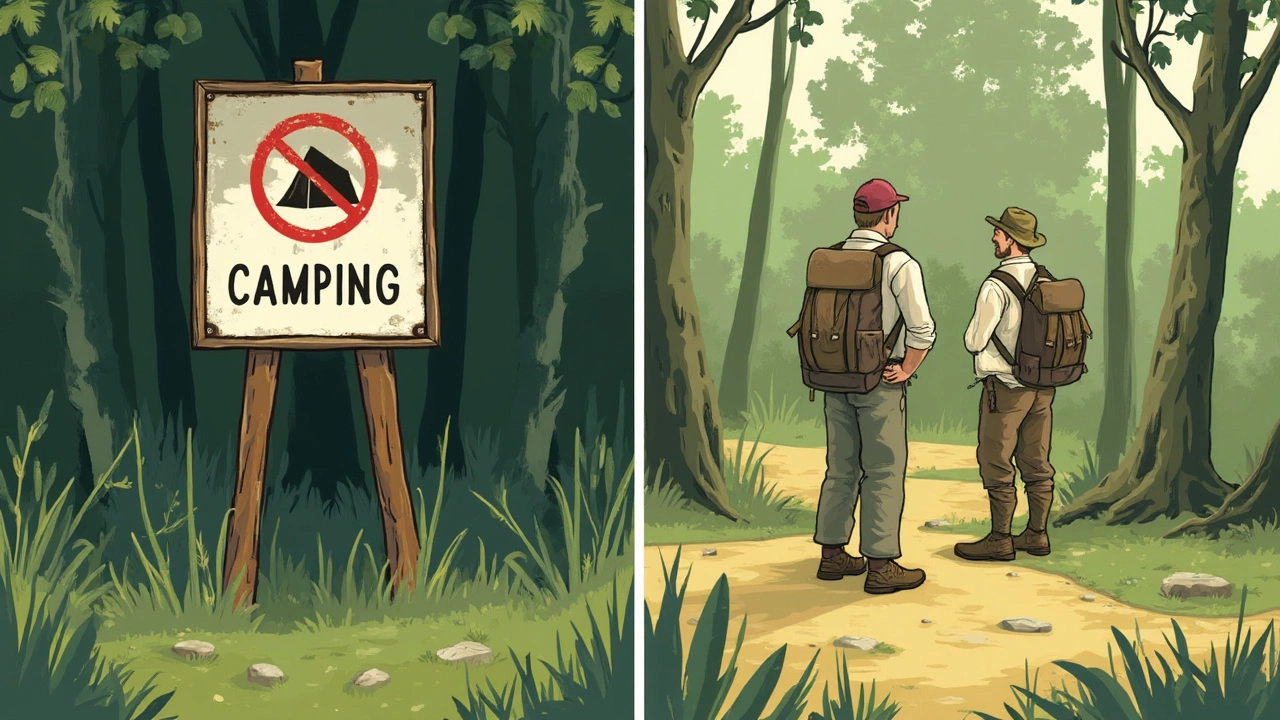
Legal Options for Forest Camping
Want to camp legally in a forest in England? It's doable if you know where to look and how to ask. While wild camping without permission is off-limits almost everywhere, some spots let you stay under the trees without hassle—if you play by their rules.
The first and easiest way is to use designated "wild camping" or "nearly wild camping" sites. These are special areas, often on private or managed land, where the owner has set aside space for a limited number of tents. Sites like these might not have showers or electricity, but you get that real wild feeling with far less risk. Forestry England, for example, sometimes runs organized low-impact camping events in forests like Sherwood Pines. You can check their website or social media for pop-up opportunities.
For a classic forest camping experience, Woodsman’s Treehouse in Dorset and Cwmffrwd Farm in Wales offer woodland pitches where you reserve a spot and get permission in advance. It’s not true wild camping, but it gets you close enough while keeping you legal.
If you're keen on pure wild camping, your best bet is to always get landowner permission before pitching up. In practice, this means finding the name of the owner—sometimes the Forestry England, sometimes a private person—and sending them a quick request. Local farmers and landowners will sometimes let you camp if you ask nicely and promise to keep things tidy.
And don’t forget, the Dartmoor National Park is the only place in England where wild camping is (kind of) allowed without specific permission, after the 2023 court case and the current access agreement. There are marked areas on Dartmoor where you can stay overnight. Always double-check their current map, as some zones are off-limits.
- Check Forestry England's official list of picnic and camping sites—most forests prohibit random camping but have a handful of designated spots.
- Look for "almost wild" campsites: check Nearly Wild Camping or Greener Camping Club for listings.
- If you want to try wild camping, always ask. Many landowners appreciate respect for their land and may say yes.
- Be ready to move on if asked—legal or not, wandering off quietly can save hassle.
| Location | Is Wild Camping Allowed? | Need Permission? |
|---|---|---|
| Dartmoor National Park | Yes, in marked camping areas | No, within zones |
| Forestry England Woodlands | No, except at events/sites | Yes, always |
| Private Forest Land | No, unless owner agrees | Yes |
So while true wild camping in forests is mostly off-limits in England, you can work the system by using legal campsites, getting permission, or picking the right national park. This way, you get the outdoors experience without risking a midnight encounter with a ranger or the landowner's dogs.
Tips for Responsible and Safe Camping
If you actually manage to get permission for wild camping in England’s forests, you’ve got to play by some unwritten rules—not just the law. Being a good camper means you don’t just keep out of trouble, you also help keep those forests open for others.
- Leave No Trace. Bag up every bit of rubbish you make, even tiny scraps or bits of food waste. Don’t bury anything, and definitely don’t leave behind toilet paper.
- Fire Safety is Huge. Most places ban open fires. A camping stove is a safer bet. Over half of wildfires in the UK start from carelessness, so don’t take chances. Double check local fire risk levels before you spark anything.
- Stay Low-Key. Use small tents that blend in. Pick your pitch late, leave early. Avoid big groups—two or three people max.
- Respect Wildlife and Plants. Don’t break branches, trample new growth, or leave food for animals. The less you disturb, the better.
- Noise Control. Keep voices down and avoid music. Sound travels far on still nights, and you don’t want to alert anyone—or put off local wildlife.
- Water Matters. Don’t wash dishes or yourself in streams or ponds. Carry your own water or collect and filter responsibly at least 30 meters from any water source.
- Have a Backup Plan. If you get asked to move on (it does happen), don’t argue. Pack up right away and be polite. Getting a reputation as trouble puts a target on all wild campers.
Here’s a quick table with the essentials:
| What To Do | Why |
|---|---|
| Get permission first | Avoids trespassing and legal drama |
| Use a small tent | Keeps things low-profile and discreet |
| Pack in, pack out | Leaves the site as you found it |
| Stick to stoves | Prevents forest fires |
| Keep groups tiny | Makes it easier to stay unnoticed |
Following these simple rules isn’t just about keeping your own camping trip safe. More people are trying wild camping in England, and if everyone respects the land and the law, we all get to keep enjoying it.

Unexpected Spots and Alternatives
You’d be surprised at the quirky and totally legal alternatives to standard wild camping in England’s forests. While tossing your tent into ancient woodland is usually off-limits, there are still plenty of ways to get that off-the-grid vibe—legally.
Small-scale woodlands sometimes offer what’s called "nearly wild" camping. Sites like Nearly Wild Camping and Greener Camping Club have networks of landowners who let you pitch among trees, often for a small fee. It’s not exactly wild, but you’re still tucking yourself away from crowds and campsite hustle. Just search online for these networks, or check their member maps for interesting locations.
If you’re looking for more rugged camping in England experiences, some landowners and farms allow backpackers to stay overnight as long as you get permission beforehand. There are even spots where glamping domes or simple forest cabins sit in tucked-away valleys—definitely not traditional camping, but still a slice of the outdoors.
Public rights of way and open access land (mapped out under the Countryside and Rights of Way Act) don’t automatically allow camping, but did you know Dartmoor National Park historically let people camp wild with certain rules? In early 2023, there was a legal fight over it, but now a deal is back in place, and you can still backpack-camp in specific Dartmoor areas for up to two nights. Always double-check their official map, though, as boundaries change.
Need some more concrete options? Here's a quick comparison of the main ways to get your forest fix in the UK:
| Option | Legal Status | Best For |
|---|---|---|
| Forestry England Campsites | Fully legal | Families, beginners |
| Nearly Wild Camping Clubs | Legal with booking | Solo campers, couples |
| Dartmoor Backpack Camping | Legal in marked zones | Solo hikers, small groups |
| Farm Woodland Camping | Legal with permission | Those wanting privacy |
If all else fails, consider a "stealth camp" in your vehicle or hammock camping at organized woodland events. It’s not fully wild, but it’ll scratch that nature itch without risking a run-in with the landowner—or the law.
Wild camping is a bit of a patchwork in England, but with some planning and the right spots, you’ll still get that woodland adventure without the hassle.
